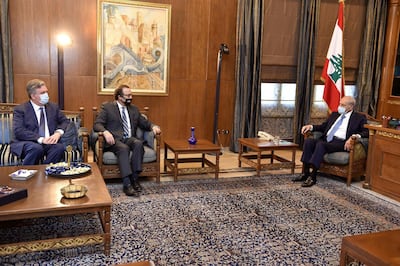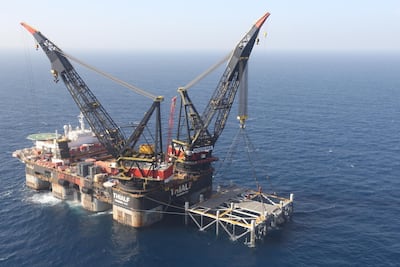Maritime talks between Israel and Lebanon could prove to be beneficial to the Arab country’s battered economy, which overwhelmingly depends on energy imports.
The two countries, which are technically at war, have taken the initiative to settle a long-standing dispute as they explore for gas in the eastern Mediterranean.
“It improves Lebanon’s creditor position,” said former Lebanese economy minister Nasser Saidi.
Lebanon and Israel lay claim to 800 square kilometres of territorial waters that are expected to contain significant gas reserves.
While the latest estimates on the potential for Lebanese gas discoveries remain unclear, earlier data offered by the government has suggested that the territorial waters could contain as much as 100 trillion cubic feet of natural gas and 865 million barrels of oil.
For a country that suffers daily power cuts of up to 12 hours, imports all of its energy needs and spends about $2 billion a year subsidising its national power company, securing energy resources is crucial. Most commercial and residential buildings throughout the country have generators.
“Lebanon actually is quite desperate for gas. They need gas,” said Siamak Adibi, a senior gas consultant at London’s Facts Global.
“The domestic market is very crucial for them to find gas and see if they can develop these potential resources for their own domestic market in future.”
The talks come at a time when Beirut desperately needs to reduce its import bill and gain access to emergency funds amid the country’s worst economic crisis since independence in 1943.
After defaulting on about $31bn of eurobonds in March, the country’s currency has declined by about 80 per cent against the US dollar while inflation now exceeds 100 per cent.
The economic woes have been exacerbated by the Beirut port explosion in August that killed at least 190 people, wounded 6,500, left 300,000 homeless and resulted in property damage worth about $15bn.
This has hastened the need to unlock aid as the economy is now poised to contract by about 27 per cent, according to the Institute of International Finance.
Talks with the International Monetary Fund on a $10bn bailout package stalled due to political disagreements. However, a resolution of the maritime dispute with Israel could help Lebanon unlock much-needed funds and reduce its public debt of $94bn.
“These negotiations are important in order to be able to begin the reconstruction and transformation of Beirut and Lebanon,” said Theodore Karasik, senior adviser at Gulf State Analytics, a consultancy in Washington.
“The [port] explosion [and] these negotiations are part of a re-landscaping of the Lebanese economy ... to boost its potential [and] also rid it of its ills.”

Lebanon is keen to replicate the success of Israel, which plans to further develop its large Levithian and Tamar gasfields and also look for new markets in the region.
“The [maritime] negotiations are sponsored by the US after both countries appealed to the UN concerning potential infringements on their sovereignty, but the talks have faced delays and postponements due to either Lebanese political crises [such as the collapse of government] or disagreement during the talks,” said Ashley Halabi, a researcher at Control Risks.
So far, Egypt and Jordan, which have peace treaties with Israel, have agreed to buy its gas.
Lebanon, which does not have a peace treaty with Israel, has been matching its steps in terms of launching licensing rounds for exploratory activities, which have yielded a bonanza of sorts for countries in the eastern Mediterranean.
However, efforts to invite oil and gas companies to explore its territorial waters have been unfruitful so far.
Upstream exploration has also been affected by the dispute with Israel, which threatened to seek arbitration if companies ventured close to the disputed waters.
Lebanon awarded offshore Blocks 4 and 9 during its first licensing round to a consortium led by Total, Russia’s Novatek and Italy’s Eni.
Early exploration attempts proved unsuccessful, with Lebanese officials left fuming after Israel announced plans to drill close to Block 9 earlier this year.
Lebanese President Michel Aoun described the plans as dangerous in June, and the lack of clarity and heated rhetoric has left energy companies sitting on the fence.
In a 2018 interview with The National, Total's chief executive Patrick Pouyanne said his company would steer clear of maritime areas contested by Israel.
Mr Adibi of Facts Global said negotiations between the two countries were “important for the future of Block 9”.
“They are closer to [the] Tamar and Leviathan fields. There might even be a high chance of additional discovery or a kind of extension of those fields,” he said.
“That is why it is important. If they can find a solution to basically negotiate over their disputed area, it basically paves the way for further exploration in existing blocks.”

An expensive remedy for Lebanese power requirements involves the use of a floating storage regasification unit that could help plug demand in the short term.
However, given Lebanon’s political and security situation, Mr Adibi believes such an option may be the “more realistic scenario” for gas imports into the country.
Some analysts such as Robin Mills, chief executive at Dubai’s Qamar Energy, doubt that the resumption of talks could lead to significant gains for Lebanon’s economy.
“Lebanon is only a small market, so we are not talking riches here,” he said.
“If they do find a big thing, they will have all the problems of developing it and exporting it like everybody else in that area has had,”
He pointed to Cyprus, which discovered the Aphrodite gasfield in 2011.
“Cyprus is a small market also like Lebanon, [but] quite a bit more transparent, less corrupt [and] easy to do business [in]. And after 10 years, Cyprus still has not developed its discovery,” Mr Mills said.
As politicians bicker over the formation of Lebanon’s next government and who becomes prime minister, the country’s battered economy is running out of time and offshore discoveries are not expected to provide immediate relief.


